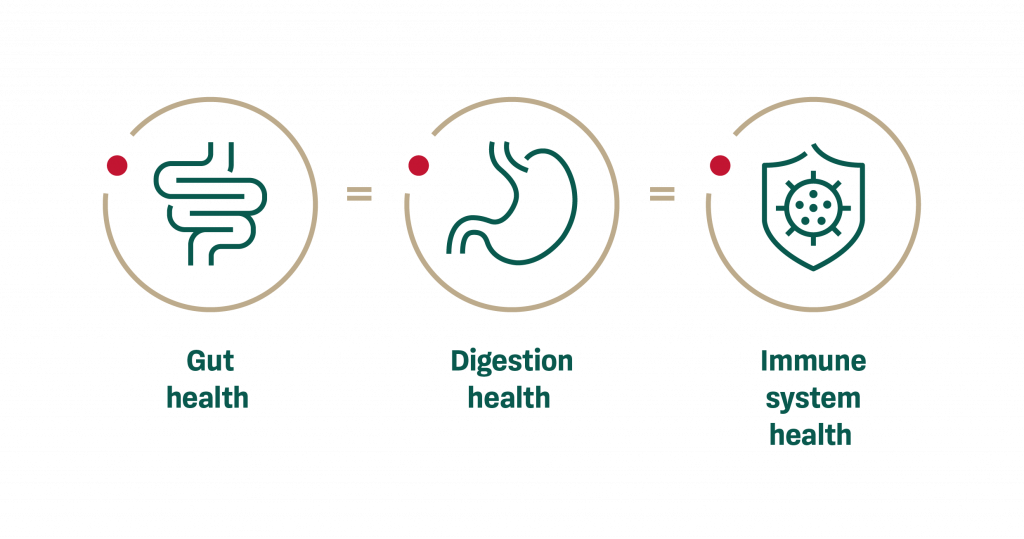Historically speaking, the digestive and immune systems were observed and researched as separate wholes. However, there are incredible similarities and common functions when we talk about the absorption of nutrients and the body’s defense against external elements.
A single layer of epithelium in the intestinal wall acts as a barrier between the environment and a person’s body. Precisely that layer of epithelium plays a key role in the regulation of immune health, and thereby health in general. The gastrointestinal mucosa performs a complex role and works as a semi-permeable membrane that enables the absorption of nutrients. At the same time, it limits the transport of potentially harmful substances; antigens, and microorganisms. A few different elements participate in the maintenance of physical and immune defense barriers of the intestinal epithelium – an external layer with commensal intestinal microbiota, antimicrobial proteins and molecules of secretory immunoglobulin A, then a central part which contains specialized epithelium cells, and the internal layer, so-called lamina propria where the innate and adaptive immune system cells are (T cells, B cells, macrophages, dendritic cells).
There is much more to the health of the digestive system than a healthy and balanced diet – around 80% of immune system cells are in the intestines which creates a unique interrelationship between the digestive and immune systems. Three levels of protection of the digestive system are tightly connected and play a key role in maintaining its health. The first level of protection represents the gut microbiome. The second level of protection is the intestinal mucosa built from a single-layer cylinder-shaped epithelium and connective tissue that is full of blood and lymph vessels, and nerves. The third level of protection is the intestinal immune system in the form of lymphoid tissue which contains the already mentioned 70% or more of immune system cells.

Gut microbiota is the collection of bacteria and other microorganisms that can be found in the digestive tract. It has been a significant object of research in the past years due to its very wide influence on a number of systems, from the regulation of cognitive functions, behavior, appetite, metabolism, and immunity, to the health of the digestive system. The relationship between gut microbiota and the immune system is symbiotic – they work together to eliminate pathogens and provide protection from harmful components the body gets in contact with. The interaction between these two systems starts already at birth – when the body for the first time gets in contact with the bacteria coming from the birth canal. Also, more and more studies speak in favor of the existence of a strong two-way relationship between the nervous and digestive systems. The brain-gut axis has an important role not just in maintaining the health of the gastrointestinal tract, but also in different brain functions. In the digestive tract, besides intestinal epithelium cells and immune cells, the composition of gut microbiota affects many cognitive functions and behavior. Moreover, different behavioral and cognitive disorders are often associated with disorders connected to the gastrointestinal tract.
The connection and effect of food on the composition of the microbiota and the function of the digestive system are more and more clear nowadays. Certain food components can disturb the integrity of the intestinal mucosa, while others – like probiotics – support the strengthening of the bonds between the epithelium cells of the intestines. Also, a link between the disruption in the communication between the bacteria of gut microbiota and immune cells with an increased risk for the development of different diseases and conditions has been established. A leaky gut is a condition in which there is a leaking in the protective epithelium barrier which starts several undesired events; entry of pathogenic microorganisms and food antigens which result in intestinal inflammation which can potentially lead to the development of numerous autoimmune diseases in genetically sensitive individuals (type I diabetes, multiple sclerosis, Hashimoto’s thyroiditis, lupus oi, etc.). On the other hand, when the body is exposed to factors such as an inadequate diet, antibiotics, different stressful conditions, etc., there is a decrease in the diversity of the gut microbiome which can lead to reduced efficiency of the immune system.

Since it is getting more and more clear that the digestive and immune systems are tightly connected, changing the kind and way of consuming food can lead to a change in gut microbiota, and healthy microbiota definitely impacts the correct immune response. By improving and balancing your diet, reducing consumption of processed foodstuffs, and including the foodstuffs rich in prebiotic fiber, the first step towards the normal functioning of both systems is made. Also, regular consumption of foodstuffs such as fermented products; from kefir, sour cabbage, probiotic yogurts, etc., restores intestinal mucosa and ensures more stable gut microbiota which affects the immune system and cognitive abilities. Studies about the effect of a diet on gut health have shown that the more foodstuffs of plant origin are consumed, the more diverse the gut microbiota is. Also, research has shown that the diet should be observed as a whole, and not individual foodstuffs when we talk about the gut microbiome. For example, a Mediterranean diet, which is very often consumed in our region, is linked to a bigger diversity of gut microbiota. In conclusion, a balanced and diverse diet that includes adequate hydration, probiotics, and prebiotics is essential for meeting nutritional needs to adequately support the regular functioning of the digestive and immune systems.
Literatura
- Vancamelbeke M, Vermeire S. The intestinal barrier: a fundamental role in health and disease. Expert Rev Gastroenterol Hepatol. 2017 Sep;11(9):821-834. doi: 10.1080/17474124.2017.1343143. Epub 2017 Jun 26. PMID: 28650209; PMCID: PMC6104804.
- EloisaSalvo-Romero, PatriciaStokes, and Mélanie G.Gareau. Microbiota-immune interactions: from gut to brain. LymphoSign Journal. 7(1): 1-23. https://doi.org/10.14785/lymphosign-2019-0018
- Desai MS, Seekatz AM, Koropatkin NM, Kamada N, Hickey CA, Wolter M, Pudlo NA, Kitamoto S, Terrapon N, Muller A, Young VB, Henrissat B, Wilmes P, Stappenbeck TS, Núñez G, Martens EC. A Dietary Fiber-Deprived Gut Microbiota Degrades the Colonic Mucus Barrier and Enhances Pathogen Susceptibility. Cell. 2016 Nov 17;167(5):1339-1353.e21. doi: 10.1016/j.cell.2016.10.043. PMID: 27863247; PMCID: PMC5131798.
- Paray BA, Albeshr MF, Jan AT, Rather IA. Leaky Gut and Autoimmunity: An Intricate Balance in Individuals Health and the Diseased State. Int J Mol Sci. 2020 Dec 21;21(24):9770. doi: 10.3390/ijms21249770. PMID: 33371435; PMCID: PMC7767453.
- Wu D, Lewis ED, Pae M, Meydani SN. Nutritional Modulation of Immune Function: Analysis of Evidence, Mechanisms, and Clinical Relevance. Front Immunol. 2019 Jan 15;9:3160. doi: 10.3389/fimmu.2018.03160. PMID: 30697214; PMCID: PMC6340979.
- Statovci D, Aguilera M, MacSharry J, Melgar S. The Impact of Western Diet and Nutrients on the Microbiota and Immune Response at Mucosal Interfaces. Front Immunol. 2017 Jul 28;8:838. doi: 10.3389/fimmu.2017.00838. PMID: 28804483; PMCID: PMC5532387.
Choose chapter:





